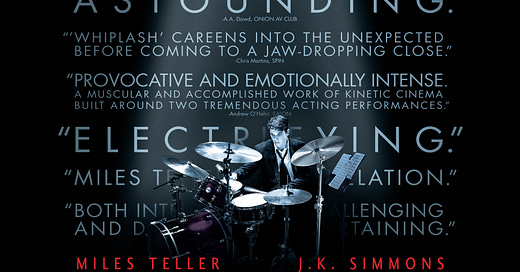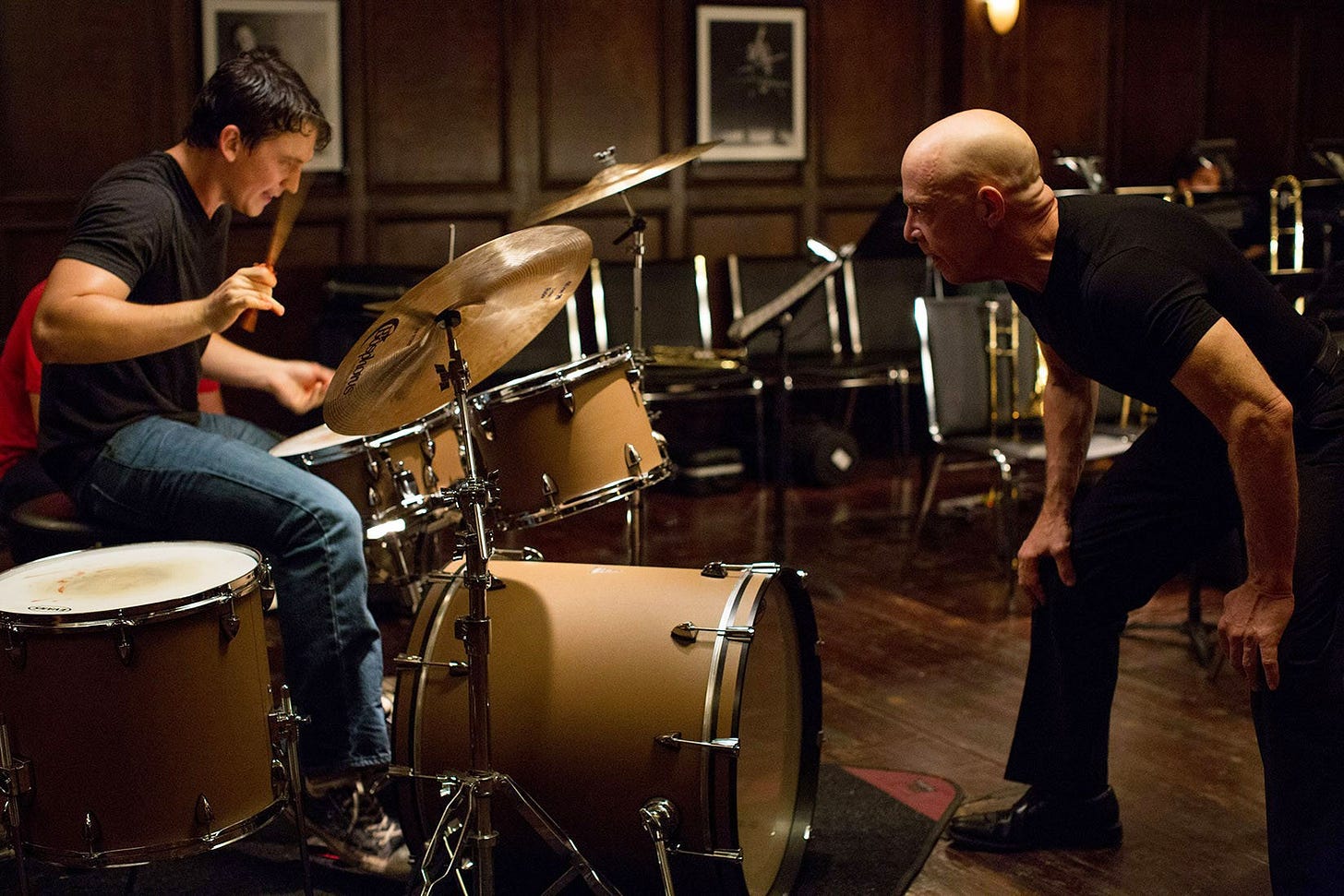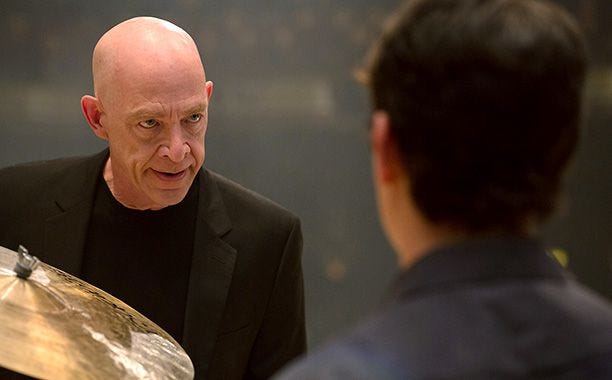The Favourites
Whiplash
Whiplash is the brash and triumphant sophomore film from director Damien Chazelle. Bursting into the film world with this film, Chazelle follows the toxic relationship that forms between a first year jazz drummer Andrew Neiman (Miles Teller), and his overbearing and abusive instructor Terence Fletcher (J.K. Simmons). Fletcher, a masterful conductor and renowned jazz aficionado, berates and belittles Neiman throughout the film, pushing him beyond not just the limits of his drumming ability but his mental and physical capacity as well. While Fletcher is constantly pushing Neiman, Meiman in return accepts and wants this abuse, believing it’s the only way for him to achieve greatness. This push and pull of abuse begins to feed off itself, and in the end the whirlwind forces of these two personalities collide on a fierce and ultimately damning ending.
There is a drive that virtually every character in the film has, just to differing degrees. When we first meet Andrew Neiman there are no signs as to what sort of drive he has. He is a semi-talented drummer, one who is good enough to get into the exclusive Shaffer Conservatory but so is every other drummer we see in the film. Fletcher is not looking for a good drummer, or a great drummer, he is on the pursuit for the drummer, the singular musician to fill his needs. And when he finds that musician he still does not want them to become complacent, to be happy with their position. Fletcher’s role is not to teach, but to draw out every ounce of talent and want from his students. He needs to know who has what it takes never to accept what is and to always look for the next step forward.
Fletcher sees himself as a warrior against a complacent society. He is on a constant quest for true greatness, and he believes that becoming great is a painful, torturous process, but it’s worth it once true inspiration occurs. He holds contempt for even the idea of telling someone “good job” because everyone is good at something, and if everyone is equally good then everyone is equally bad. He has no interest in creating something good or melding good musicians. If you are not the best, why bother to continue? The world was not created by goodness, but by greatness, and if you do not want to change the world with your music then Fletcher does not want you to make music.
Nieman, you earned the part. Alternates, will you clean the blood off my drum set?
This is a quality that Andrew holds as well, a seedling at first that quickly blossoms into a black rose of obsession. We see when he has a family dinner that he is unimpressed with his cousins’ achievements as they are not the best at what they do. The cousins are the top tier of a third-tier school, which means nothing to Andrew because it’s not number one. His family’s inability to understand what drumming means to Andrew and why he is so great at it makes him even more susceptible to Fletcher’s machinations. Andrew is desperately looking for affirmation that he has never received from his family. When Fletcher gives him a taste of it only to pull away viciously, Andrew is immediately hooked. He no longer looks to impress his family for he has found someone worthy of his goals and dreams.
This is what we see at the end of the film. While Andrew is first humiliated by Fletcher, having brought him to the final concert under false pretenses and forcing him to play a song he didn’t know, Andrew can recenter and come back at Fletcher with the same energy thrown at him. While this throws Fletcher off at first, we see him accept this challenge, possibly the first he’s had in a very long time. Fletcher pushes, Andrew pushes back harder, and this dynamic will feed off each other until one of them burns out or dies. It’s what happens when an unstoppable force meets an immovable object, and the film is Andrew proving he’s that object to Fletcher.
This will cause Andrew to lose everything else that matters to him. We see him abandon his budding romance with Nicole not only to focus on his drumming but also because he doesn’t understand her lack of drive. Nicole is laid back in her studies and unsure of her future, but this isn’t a concern for her, while Andrew has his destiny predetermined in his mind. The idea of not knowing what you’ll do with your life terrifies Andrew. We also see him grow more distant from his father, a man who did not achieve all his dreams, a daily reminder of what failure looks like. While the film starts with a strong relationship between the two, with Fletcher’s influence Andrew begins to see his father as a failed author and husband, and in the final moments of the film Andrew chooses to push himself further with Fletcher instead of embracing the love of his father. In the closing moments, there is only music for him.
The unfortunate thing is that Fletcher will never fully see Andrew as his equal, no matter what. Fletcher appreciates the challenge that Andrew has proved for the conductor but it’s unlikely to last. We see Fletcher’s manipulations, both overt and subtle, throughout the film, and such deep-rooted hostility is unlikely to simply fade. Something as simple as calling Andrew “Neeman” instead of “Nayman”, quietly strips him of his identity. Bringing in Andrew’s former classmate to have them face against each other in a grueling, hours long rehearsal, with Fletcher knowing full well that Andrew is the one he’ll choose. Forcing rivalries between his students, using them in ways that are not for the cohesion of a band, but for cohesion in Fletcher’s world.
For the record, Metz wasn't out of tune. You were, Erickson, but he didn't know and that's bad enough.
These manipulations won’t end after the credits, as they define Fletcher as a person. When he is stripped of his position as a teacher he is given the opportunity for reflection and growth, an opportunity he rejects adamantly. He even goes about his most sadistic ploys only after being robbed of his position of power. The humiliation of Andrew in the final scene was a long scheme, one that festered in the time between Fletcher’s dismissal and their eventual reunion. This time could have been spent on letting go of his pain, but Fletcher is nothing without that pain, without his power. So when the film cuts to black we know that this rivalry will never be between equals, for it is not a rivalry of musicianship but deceit and humiliation.
Not quite my tempo. This scene is an encapsulation of the entire dynamic Andrew and Fletcher have in the film and will continue to have. The scene starts with Andrew believing he’s reached a specific goal and pleased Fletcher. As the scene continues, we see Fletcher actively dismantle that idea and target Andrew viciously until he breaks down completely. Andrew’s failure then forces him to work harder, faster, better until the scene is set to repeat over and over again. They are stuck in this push and pull, this accomplishment and humiliation cycle. And Fletcher is in complete control of this at all times. It’s Fletcher’s tempo that must be matched, not Andrew’s. And, if the final scene is to be believed, Andrew is too far gone to ever realize this.
Chazelle’s use of the camera is used both to build the tension of the music and the tension between these two opposing forces. The camera is incredibly dynamic, whipping between characters, crashing into and out of scenes, nearly giving the audience the titular whiplash. The camera is Chazelle’s instrument, and he is doing his best to keep with the tempo of the character and performance from J.K. Simmons sets. Even though Chazelle is the director, it’s still Fletcher who is in control of every frame. Even though it’s Andrew who is in every frame, it’s Fletcher who dominates the film. Fletcher is in control of everything if he’s allowed to be, and Andrew is doomed to live a short (if near-perfect musically) life because of it.
Whiplash focuses on a drummer because of the brazenness of the instrument. It’s absurdly loud, fast, demanding, and the film is as tremendously evocative as the instrument. Andrew’s relative softness is in contrast with his instrument, and it’s only through the pressure exerted by Fletcher that he can become someone who should play the drums. Chazelle’s camerawork crashes and bashes along with the drum, it builds tension like a steady beat, and it ends as dramatically as the clashing of a cymbal. Leaving the film you’ll be shaken, and for good reason. This is a deeply troubling film, and it ends with the knowledge that the true test is only just beginning.








Good job!...I mean that will do. I love the use of offset quotes that aren't in the review itself. I've never understood offsetting quotes that are already in an article itself, especially when they appear right next to eachother.